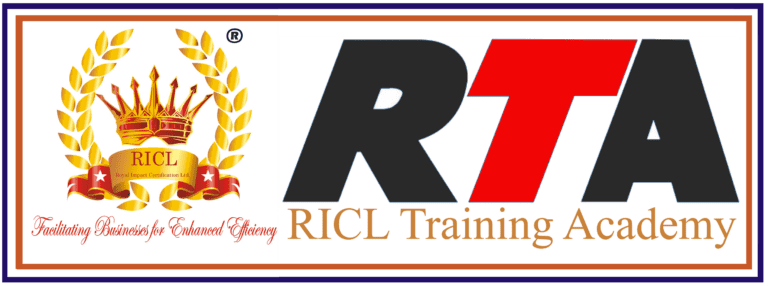A certified Lead Auditor in QMS! Master ISO 9001 standards to enhance quality management and drive organizational excellence. Enroll now!
ISO 9001 QMS Lead Auditor Training:
Boost Your Quality Management Performance
Boost Your Quality Management Performance.
In the field of quality management, a lead auditor’s job is essential to making sure that companies follow global norms and keep improving their procedures. The ISO 9001 Quality Management Systems (QMS) Lead Auditor training course offered by RICL Training Academy is Exemplar-accredited and is intended to give professionals the skills necessary to effectively lead audits and promote quality improvements inside their companies.
Course
1. Understanding ISO 9001 Standards:
Overview of ISO 9001 Requirements: This section provides a detailed introduction to the ISO 9001 standard, including its structure, scope, and objectives. Participants will learn about the requirements that organizations must meet to achieve certification.
Key Clauses and Their Implications for Quality Management: Dive into the specific clauses of ISO 9001, understanding their implications for quality management practices. This includes the context of the organization, leadership, planning, support, operation, performance evaluation, and improvement.
2. Principles of Auditing:
Introduction to Auditing Principles and Best Practices: Learn the fundamental principles of auditing, including independence, evidence-based approach, and systematic methodology. Understand the best practices that ensure effective and efficient audits.
Importance of Audits in Maintaining Quality Standards: Explore the critical role of audits in maintaining and improving quality standards within an organization. Understand how regular audits contribute to continuous improvement and compliance.
Ethics and Responsibilities of Lead Auditors: Discuss the ethical considerations and responsibilities of Lead Auditors. Emphasize the importance of integrity, confidentiality, and objectivity in the auditing process.
3. Audit Planning and Preparation:
Developing an Effective Audit Plan: Learn how to create a comprehensive audit plan that outlines the audit scope, objectives, criteria, and resources. Understand the importance of planning in ensuring a structured and efficient audit process.
Preparing Audit Checklists and Documentation: Gain skills in preparing detailed audit checklists and documentation to guide the audit process. Learn how to tailor checklists to specific audit objectives and criteria.
Risk-Based Thinking in Audit Planning: Incorporate risk-based thinking into audit planning to identify and prioritize areas of potential non-conformity. Understand how to assess and mitigate risks during the audit process.
4. Conducting the Audit:
Opening Meetings and Audit Initiation: Learn how to conduct opening meetings to initiate the audit process. Understand the importance of setting clear expectations and establishing communication with the auditee.
Gathering and Evaluating Evidence: Develop skills in gathering and evaluating objective evidence to support audit findings. Learn techniques for collecting information through observations, document reviews, and interviews.
Conducting Interviews and On-Site Activities: Gain expertise in conducting effective interviews and on-site activities. Understand how to interact with auditees, ask relevant questions, and observe processes to gather accurate evidence.
5. Audit Reporting:
Compiling and Presenting Audit Findings: Learn how to compile and present audit findings in a clear and concise manner. Understand the importance of factual reporting and how to structure audit reports for maximum impact.
Writing Comprehensive Audit Reports: Develop skills in writing comprehensive audit reports that provide a balanced view of strengths and weaknesses. Learn how to document non-conformities and provide actionable recommendations.
Communicating Audit Results to Stakeholders: Explore strategies for effectively communicating audit results to stakeholders. Understand the importance of clear communication in ensuring that audit findings are understood and acted upon.
6. Corrective Actions and Follow-Up:
Identifying Non-Conformities: Learn how to identify and categorize non-conformities during the audit process. Understand the criteria for determining the significance of non-conformities and their impact on the organization.
Developing and Implementing Corrective Actions: Gain expertise in developing and implementing corrective actions to address non-conformities. Learn how to create action plans that are specific, measurable, achievable, relevant, and time-bound (SMART).
Follow-Up and Verification of Corrective Actions: Understand the process of follow-up and verification to ensure that corrective actions have been effectively implemented. Learn how to evaluate the effectiveness of corrective actions and close out audit findings.
7. Case Studies and Real-World Scenarios:
Practical Exercises and Case Studies: Engage in practical exercises and case studies to apply auditing concepts in real-world scenarios. Learn from real-life examples and practice problem-solving skills.
Role-Playing and Mock Audits: Participate in role-playing and mock audits to gain hands-on experience. Understand the dynamics of conducting audits and improve your confidence in leading audit teams.
Lessons Learned from Real-World Audit Scenarios: Discuss lessons learned from actual audit scenarios. Understand common challenges and best practices in overcoming them to ensure successful audit outcomes.
Benefits of Lead Auditor Training
1. Enhanced Career Prospects
- Gain a competitive edge in the job market
- Open doors to new career opportunities in auditing and compliance
2. Improved Knowledge and Skills
- Develop a thorough understanding of ISO 9001 standards
- Enhance your auditing skills and techniques
3. Increased Organizational Value
- Help your organization maintain and improve quality management systems
- Contribute to achieving and maintaining ISO 9001 certification
4. Professional Recognition
- Obtain Exemplar-accredited certification
- Gain recognition as a qualified Lead Auditor
5. Practical Insights and Real-World Application
- Learn from industry experts with real-world experience
- Apply practical insights to your auditing practices
Key Points
- Flexible Online Learning: Our courses are conveniently available online, allowing you to learn at your own pace and from any location.
- Expert Instructors: Learn from experienced industry professionals who bring a wealth of practical knowledge to the training.
- Comprehensive Curriculum: Our training programs cover all aspects of the auditing process, ensuring a well-rounded understanding of the subject matter.
- Interactive Training: Engage in practical exercises, case studies, and role-playing scenarios to reinforce learning.
- Certification: Receive an Exemplar-accredited certification upon successful completion of the course, validating your expertise as a Lead Auditor.
Explore Our Wide Range of ISO Certification Courses
In addition to our ISO 9001 QMS Lead Auditor training, RICL Training Academy offers a variety of other ISO certification courses to meet diverse professional needs:
- ISO 14001 Environmental Management Systems (EMS)
- ISO 45001 Occupational Health and Safety Management Systems (OHSMS)
- ISO 27001 Information Security Management Systems (ISMS)
- Lead Auditor Courses for QMS, EMS, and OHSMS
- Internal Auditor Courses for QMS, EMS, and OHSMS
- Awareness Auditor Courses for QMS, EMS, and OHSMS
- Exemplar Global Courses
Classroom Training for ISO 9001 QMS Lead Auditor
Experience immersive, hands-on learning with RICL Training Academy’s classroom training for ISO 9001 Quality Management Systems (QMS) Lead Auditor.
Our classroom training provides a dynamic learning environment where you can engage directly with experienced instructors and peers. This training format offers practical, real-world applications of auditing principles and ISO 9001 standards, ensuring you gain comprehensive knowledge and skills in quality management and auditing.
Key Features:
- Interactive Learning: Participate in live discussions, practical exercises, and group activities that enhance your understanding of auditing concepts.
- Expert Instruction: Learn from seasoned industry professionals who offer valuable insights and real-world experience.
- Hands-On Practice: Apply your knowledge through role-playing, mock audits, and case studies to develop practical auditing skills.
- Certification Preparation: Prepare thoroughly for Exemplar-accredited certification with a well-rounded curriculum designed to ensure your success.
[Form id=”6″]

TESTIMONIALS
What Our Cutomers are Saying About us

Ruis aute irure dolor in reprehender voluptate velit esse cillum dolore fugiat pariatur sint occaecat cupidata non proie sunt in culpa aui officede









Reach us at:
info@ricliso.com
Call us at:
+91 – 9266666836
Visit us at:
Royal Impact Certification Limited
623 Tower -B, The Ithum Sector – 62, Noida, 201301.
Copyright © 2024 RICL Training Academy Team


